The Jewel in The Crown: A Night of Appreciation of the “Spiritual Beatle”
By Louise Guthrie | Dec 08, 2019
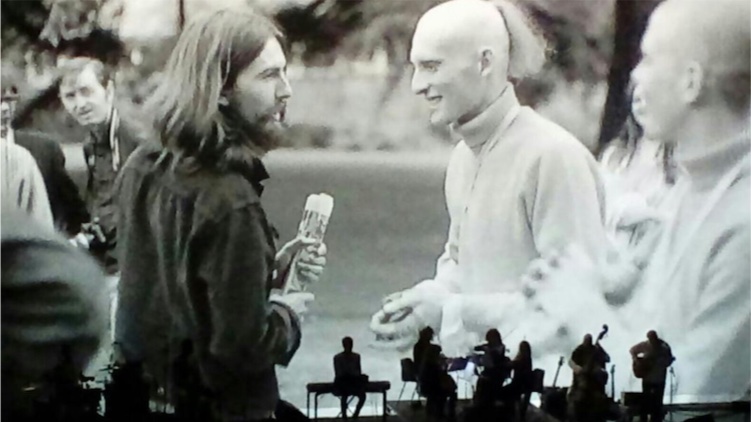
“Blessed is he whose fame does not outshine his truth” — Rabindranath Tagore
“It’s a subtle mind-shift between entertainment and appreciation” says our host Sakshi Gopal das, having greeted us all warmly this chilly Friday eve, 29th November 2019, “but let’s all appreciate what we owe George Harrison. Where would we be without him and the Beatles? We certainly wouldn’t be sitting here, now, in a manor house on a country estate that he gave to us”.
“In fact,” he muses “would Krishna Consciousness have even developed in quite the same way in the UK without George’s support?”
We are gathered for an evening of musical and anecdotal homage to a man whose fame ultimately never outshone his truth. Because it’s 18 years to the day since George Harrison, ‘the spiritual Beatle’, died.
As George said in 1982 to Mukunda Goswami (one of six pioneers who brought the Hare Krishna movement to the UK back in the late 1960s): “I was in a rock band but I didn’t have any fear, because I had seen dhotis, your robes, and the saffron colour and shaved heads in India. Krsna consciousness was especially good for me because I didn’t get the feeling that I’d have to shave my head, move into a temple, and do it full time. So it was a spiritual thing that just fit in with my life-style. I could still be a musician, but I just changed my consciousness, that’s all”.
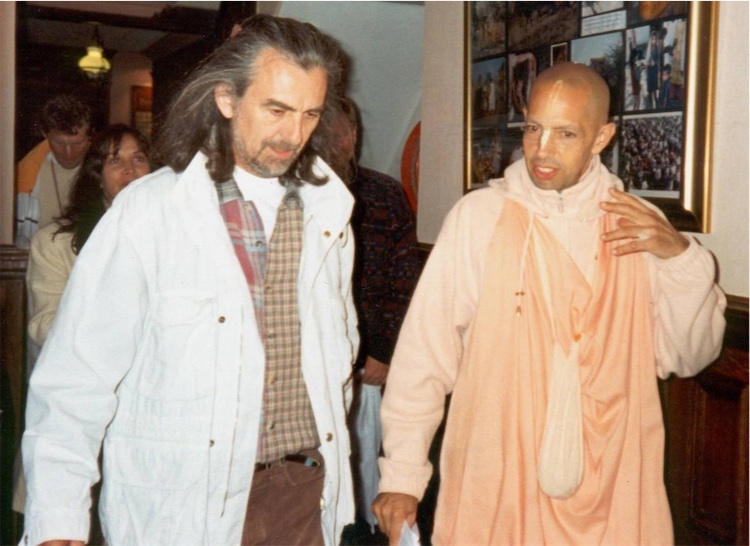
George and Mukunda
Not just your own, George, you helped change the consciousness of a generation. However, despite his considerable fame and commercial success, tonight’s event is not in honour of George’s ‘show-business’ accomplishments as such; but is, instead, set to be an intimate, unpretentious and authentic tribute to the Liverpool musician who not only embraced Indian culture but also broadened the scope of popular music through his incorporation of Indian instrumentation and Vaishnavism-aligned spirituality in the Beatles’ work.
Let’s face it, anyone who harbours a ‘deep and meaningful’ Beatles fixation coupled with vague and indeterminate spiritual leanings, is, in all likelihood, going to be openly receptive to something as defined, accessible and non-sectarian as Krishna Consciousness. (After all, it was good enough for a Beatle!) Equally, long-term Krishna devotees cannot fail to acknowledge the pivotal role the ‘spiritual Beatle’ played in nudging Eastern philosophy irreversibly towards the mainstream, and they have to value his open generosity as well. (In 1970 George provided the funds to pay for the printing of the ‘Krishna book’ (Krishna the Supreme Personality of Godhead). He also gave financial support when the Radha Krishna Temple secured its first permanent premises at Bury Place in central London.)
So where better to celebrate George’s legacy than here in premises that now house a bona fide Gaudiya Vaishnava temple set in the Hertfordshire countryside of England, donated, (as just mentioned by our compère), by Harrison himself in 1973.
As a handful of musicians set themselves up in order to settle down for a while in this warm and welcoming ground-floor manor room (on what would otherwise be just another cold dark winter’s evening), Sakshi Gopal continues:
“The Beatles came from a higher realm, they must have hailed from a higher planetary system to achieve what they did, and to be able to exert that level of influence here on earth in such a short time. And The Beatles formed the setting for the jewel that was George Harrison”.
Our MC even goes so far as to question whether George “would have had the same effect in promoting Eastern belief-systems had he been part of a less prolific pop group”.
Who knows, most likely not, but the important thing to remember is that George Harrison was never about self-aggrandisement. The reason we are assembled tonight is because the man sometimes referred to as ‘the quiet Beatle’ (although he could actually ‘talk for England’!) was first and foremost in pursuit of self-realisation.
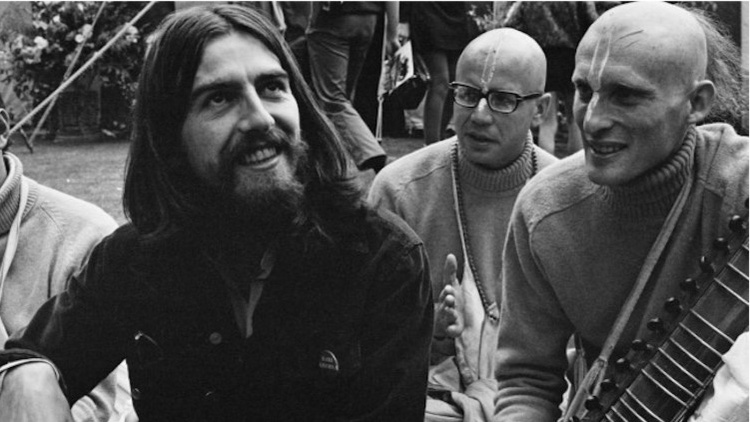
The ‘spiritual’ Beatle
“We’re here in celebration of the fact that George used whatever talent, ability and impact he had in the same way that any other Hare Krishna devotee would – purely and in service” says our compère “and, significantly, it didn’t take him very long at all to recognise that our great founder-acharya, Bhaktivedanta Swami Srila Prabhupada, was the embodiment of all that he preached”.
George said of Prabhupada: “He once said that he was the servant of the servant of the servant of God. So what does that make me? I’m the servant of the servant of the servant of the servant.”
In fact Prabhupada called George “the archangel of ISKCON” (The International Society for Krishna Consciousness) – high praise indeed.
We are very lucky to have with us two of those same six pioneers who not only introduced George to Gaudiya Vaishnava philosophy and practice but also resourcefully secured ISKCON’s first firm foothold here in the UK. By fortunate coincidence, Shyamasundar dasa and Gurudas are in this country for a couple of weeks to help celebrate 50 years of the movement they so capably established here.
They will, in the course of the evening, furnish us with vivid first-hand accounts of what it was like to be part of the Beatles’ inner circle, (many of which Shyamasundar documents in his illuminating memoirs Chasing Rhinos with the Swami). The animated pair deliver their tales with an energy and authenticity that sears cleanly through 5 decades.
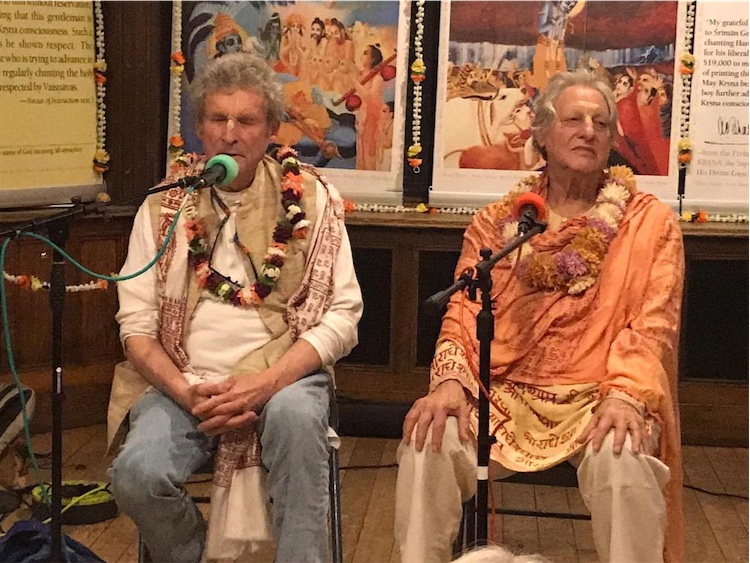
The Boys are Back in Town
Shyamasundar describes to us his very first meeting with George Harrison. Having somehow managed to wangle his way into the Beatles’ Apple offices in London’s Savile Row, he was successively overlooked by John, Paul and Ringo as they each passed through a crowded noisy room. George, however, made a beeline for Shyamasundar, saying: “Hare Krishna. I’ve been waiting to meet you. Where have you been?”
“It was like we just picked up where we left off, two incarnations ago” says Shyamasundar “it must have been that saffron dhoti” he jokes.
We could listen to Gurudas and Shyamasundar for hours. But we are also here to enjoy George’s music, and tribute band The Inner Light play us a fine selection of songs that were inspired by his Hare Krishna values and beliefs. In ‘Awaiting on You All’ Harrison sang about chanting God’s name as a means to cleanse and liberate oneself from the impurities of the material world. The song ‘Living in the Material World’ ends with the line “Got to get out of this place by the Lord Sri Krishna’s grace, my salvation from the material world”.
Devotee and singer Govinda Priya now takes informally to the microphone, with her contented baby on her lap listening (as closely as the rest of us) as she weaves a spell over the room with a crystal-clear and heart-felt rendition of ‘The Light that has Lighted the World’
I’m grateful to anyone
That is happy or ‘free’
For giving me hope
While I’m looking to see
The light that has lighted the world
By the time our tribute band play ‘Something’, a love-ballad that has been covered by over 150 artists (including Elvis Presley), and which Frank Sinatra declared to be “greatest love song of the past 50 years”, Gurudas has already reminded us that “George actually wrote that song for Krishna.” Somehow, we don’t doubt that.
Shyamasundar also relates how he lived at George’s home, Friar Park (a 120-room Victorian neo-Gothic mansion in Henley-on-Thames) during the time George was writing his ‘All Things Must Pass’ album. An audience member asks him whether, therefore, he had any direct influence on George’s lyrics. Shyamasundar duly reveals how he was up a ladder doing some renovation work inside the house, when George returned home from the recording studios with some friends, including Billy Preston (an American artist whose work encompassed R&B, rock, soul, funk and gospel). The performers were practicing some gospel chord changes to chorus-lines of “Halleluja” and “My Sweet Lord”. Shyamasundar spontaneously joined in from his ladder-top by chanting “Hare Krishna, Hare Rama”. The Maha Mantra stuck and subsequently became part of the finished tune, which topped sales charts around the world.
My idea in “My Sweet Lord,” Harrison later said about his massive hit, “was because it sounded like a “pop song,” was to sneak up on them a bit. The point was to have the people not offended by “Hallelujah,” and by the time it gets to “Hare Krishna,” they’re already hooked, and their foot’s tapping, and they’re already singing along”
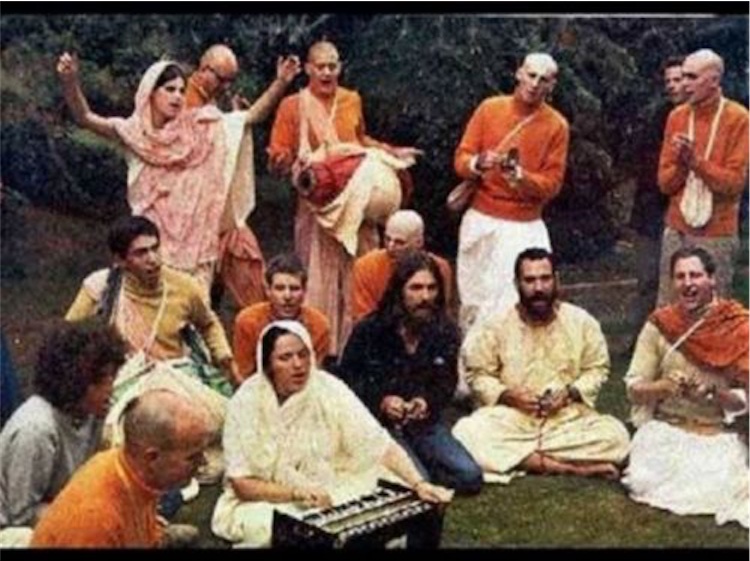
All Set for the Mainstream
The words “Hare Krishna” had, in fact, so Sakshi Gopal tells us, first entered the collective consciousness with the 1967 Lennon-MCartney composition ‘I am the Walrus’ , the seventh verse of which mentions a certain “elementary penguin singing Hare Krishna” (an oblique reference, Sakshi Gopal reveals, to American Beat Generation poet Allen Ginsberg). They surface again in Lennon’s 1969 anti-war anthem ‘Give Peace a Chance’ where the phrase “Hare, Hare Krishna” is audible in the opening refrain.
Prabhupada raised the idea that The Beatles might release the Hare Krishna mantra as a single, to ensure the sacred sound got maximum exposure.
“The Beatles had so much influence at the time on people’s consciousness” Shyamasundar affirms, “more so than kings, queens, and even popes”.
But it was Harrison who chose to record a full version of the 16-word Maha Mantra, sung – in both verse and chorus – by the London-based ISKCON devotees and issue it as a single on Apple Records the same year. The disc was a commercial success.
Sakshi Gopal das asks which of us, this evening’s audience, first became aware of the Hare Krishna mantra through media and recordings, rather than by word of mouth, and for the most part we admit that yes, we heard it on the radio….
Of course, no occasion at Bhaktivedanta Manor would be complete without some fortifying food prepared in accordance with Vedic principles (prasadam). George absolutely loved prasadam. And so we are treated to thick vegetable soup, home-made bread with freshly churned butter, savoury Indian snacks and cookies.
George Harrison departed from the world in 2001, in his family’s words, “as he had lived in it, conscious of God, fearless of death, and at peace“. 35 years of devotion to Krishna Consciousness had prepared him for the next stage of his journey beyond the material world.
Yet, as today has shown, in a way he’s never left us.
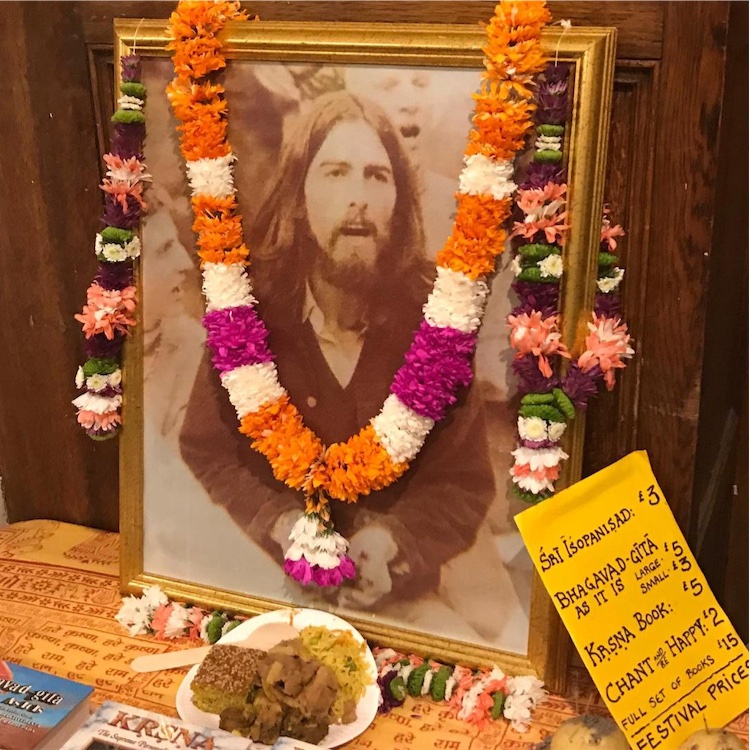
A Token of Appreciation















